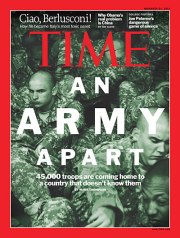
Retired lieutenant general Karl Eikenberry has written a clear-eyed piece here, in the Winter 2013 issue of the Washington Quarterly, on the growing gap between the U.S. military and American society.
The issue has become increasingly important after more than a decade of war has left the U.S. public weary of combat and, in many cases, ignorant that fighting continues in Afghanistan. Eikenberry traces much of the disconnect back to the end of the draft 40 years ago.
Eikenberry concludes:
In the end, if the establishment of the AVF in 1973 did entail unanticipated and rarely acknowledged costs in terms of political ownership and accountability, does it even matter? I contend it most profoundly does. There are three reasons this is so.
First, as previously discussed, the great expense and frequent employment of the all-volunteer force have become givens within our body politic. The U.S. military, ever versatile and ready to confront new security challenges, has become Thor’s hammer that makes increasing numbers of foreign policy problems appear to be nails which the U.S. military must address…Our relatively insulated defense spending is rarely included in serious debates about a comprehensive security strategy that must be founded upon economic strength and human capital…
Second, to the extent that the inception of the all-volunteer force has allowed and tempted the United States to frequently deploy superbly trained and equipped troops into harm’s way, there have been unintended consequences. One is reminded of the tale of the knight who returned to the castle after a long hard day of battle and reported proudly to his king, ‘‘Sire, I have been defeating the soldiers and burning the towns of your enemies in the west all day on your behalf.’’ The king, taken aback, exclaimed, ‘‘But I have no enemies to the west!’’ The knight, crestfallen, said, ‘‘Well, you do now, Sire!’’…
Third and perhaps most significant is the effect that the end of the obligation of military service has had on the civic virtue necessary to sustain a republic. We collectively claim the need for a robust armed forces given the multi-faceted foreign threats our country faces, and yet as individuals, do not wish to be troubled with any personal responsibility for manning the frontier. The merits of the volunteer force are clear and few Americans have a strong desire to return to a draft. Moreover, it may be possible to address certain negative consequences of the all-volunteer force through various policy means and approaches separate from reinstating conscription. In fact, given the stakes, we must find a way to deal explicitly with the shortcomings of the all-volunteer force in an incremental, politically pragmatic fashion. But that process has to start with an honest and serious admission of that force’s drawbacks…
Always nice to see a former top U.S. commander in Afghanistan – as well as Washington’s ambassador to Kabul – endorse our cover story, here, related, here, from nearly 18 months ago.



